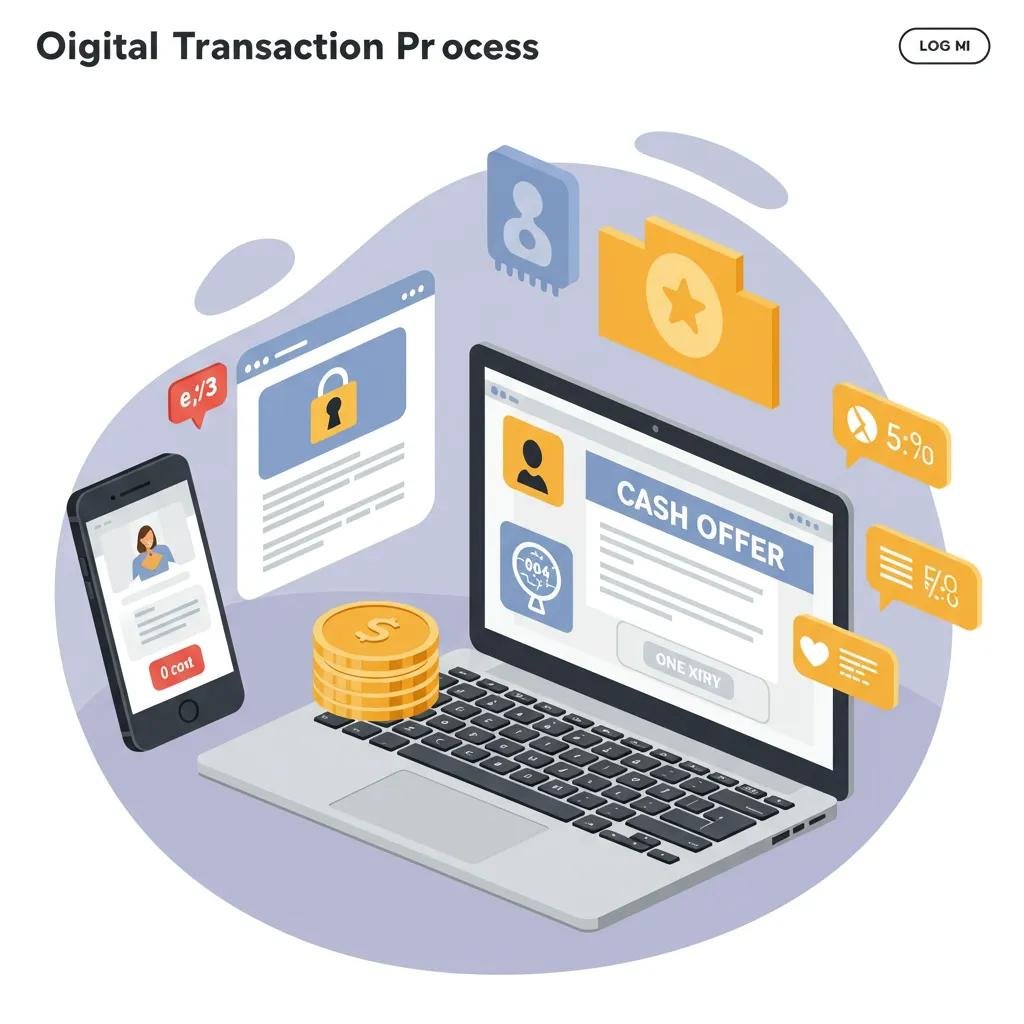
Are Digital Contracts Safe? Understanding Online Agreement Security and Legality for Home Sellers
Homeowners facing quick sales often wonder if signing digital agreements compromises security or legal standing. As selling a house for cash increasingly relies on electronic signatures and encrypted contracts, clear guidance on online contract security is vital. This article explains how electronic signature security works, outlines federal and state legal frameworks, and provides practical steps for homeowners to confirm legitimacy and protect personal data. We’ll explore core concepts—from encryption methods to fraud prevention—then show how Sell My House Pro applies these practices in its fast-cash offer process. You’ll gain confidence in digital agreements, learn to spot red flags, and understand the advantages and limits of secure online real estate contracts.
What Are Online Contracts and How Do Electronic Signatures Work?
An online contract is a legally binding agreement executed entirely in digital form, combining electronic documents with verified signatures. Electronic signature security relies on encryption and identity verification to ensure that signers cannot deny their commitments. Digital contracts streamline real estate offers by replacing paper paperwork while preserving enforceability under U.S. law.
Electronic signatures validate agreements by embedding certificate-based credentials and time-stamped audit trails. Authentication methods include multi-factor checks—such as one-time codes and biometric scans—that confirm signer identity. These measures prevent tampering by creating tamper-evident records and linking signature metadata to each document version.
Understanding these security layers leads naturally to examining the specific encryption protocols that protect data at rest and in transit, which we’ll detail next.
What Is an Online Contract and Its Role in Real Estate Transactions?
An online contract is a digital version of a purchase agreement that home sellers and cash buyers exchange electronically. It functions as the core legal instrument for transferring property rights, detailing offer price, closing timeline, and contingencies. By using e-contracts, homeowners can receive fast cash offers without in-person meetings, reducing delays and administrative overhead. This mechanism underpins the convenience of selling directly to investors and introduces robust security controls to protect all parties.
How Do Electronic Signatures Validate Digital Agreements?

Electronic signatures validate contracts by capturing signer intent and identity through digital certificates and cryptographic keys. When a homeowner signs an agreement, a unique hash of the document is created and encrypted with the signer’s private key. The system records signer authentication events—such as password entry or one-time code verification—ensuring that the signature corresponds to an authorized individual. This process confirms both document integrity and signer consent, making the contract admissible in court.
What Security Measures Protect Electronic Signatures?
- End-to-end encryption safeguarding documents from unauthorized access.
- Multi-factor authentication confirming signer identity with codes or biometrics.
- Audit trails logging each signing event and document change.
- Certificate authorities issuing digital certificates that verify signer credentials.
These controls work together to prevent forgery, unauthorized changes, and replay attacks. With these measures in place, online contracts achieve security levels comparable to—and often exceeding—traditional paper processes.
How Does Encryption Ensure the Security of Online Contracts?
Encryption scrambles contract data into unreadable ciphertext, both when stored and during transmission. Advanced algorithms—such as AES-256 for data at rest and TLS 1.3 for data in transit—ensure that only authorized systems or individuals with decryption keys can view the document. This prevents eavesdropping, man-in-the-middle attacks, and unauthorized downloads. Encryption also underlies the integrity check: any alteration to encrypted data invalidates the signature hash, immediately signaling tampering and preserving trust in the digital agreement.
Are Online Contracts Legally Binding for Real Estate Sellers?
Yes, online contracts carry full legal weight for property transactions when they comply with federal and state electronic signature laws. The ESIGN Act and Uniform Electronic Transactions Act (UETA) establish that electronic agreements are equivalent to their paper counterparts, provided certain conditions—such as consumer consent and record retention—are met. These laws ensure binding commitments for offers, purchase agreements, and disclosures across most U.S. jurisdictions.
What Is the ESIGN Act and How Does It Protect Digital Agreements?
The ESIGN Act is a federal statute that grants electronic signatures the same legal status as handwritten signatures. It requires that parties consent to using electronic records and that the system maintain records capable of accurate reproduction. By mandating consumer notification of electronic processes and retention capabilities, ESIGN safeguards signer rights and provides a clear framework for enforcing digital contracts in federal and state courts.
How Does the Uniform Electronic Transactions Act (UETA) Support Online Contracts?
UETA, enacted by most states, complements ESIGN by defining uniform requirements for electronic records and signatures. It clarifies contract formation, signature attribution, and admissibility of electronic records. Under UETA, a state’s laws cannot deny enforceability of e-contracts solely because they are electronic, ensuring consistent treatment of online real estate agreements at the state level.
Are Online Offers and Purchase Agreements Binding in All States?
Most states have adopted UETA or similar legislation, making online offers and purchase agreements legally binding nationwide. A few jurisdictions may impose additional requirements—such as notarization or witness signatures—but the vast majority accept electronic property sale documents. Sellers should verify state-specific statutes, but in practice, digital closing platforms handle local compliance automatically, reducing homeowner uncertainty.
What Legal Requirements Must Online Real Estate Contracts Meet?
To be enforceable, online real estate contracts must:
- Demonstrate clear signer consent to electronic processes.
- Provide a record-keeping system that reproduces the complete contract.
- Include a legally sufficient signature method (e-signature or digital certificate).
- Disclose any technology requirements to the signer in advance.
Meeting these conditions ensures that digital agreements satisfy both ESIGN Act and UETA standards for legal validity.
How Can Homeowners Ensure Their Online Real Estate Contracts Are Secure?
Homeowners can verify security by following a few actionable steps that mitigate risk and reinforce confidence in digital closing processes.
Before signing, confirm buyer legitimacy and platform security features. Next, safeguard personal data by using private networks and encrypted devices. Finally, communicate through verified channels that support end-to-end encryption and maintain tamper-evident logs. These measures significantly reduce exposure to fraud and protect sensitive information during each stage of the transaction.
How to Verify the Legitimacy of Online Home Buyers Like Sell My House Pro?
To verify an online buyer:
- Confirm the company name and website domain match official records.
- Request a sample digital contract and review the audit trail features.
- Ask about encryption standards (e.g., AES-256) and authentication methods.
- Look for evidence of compliance with ESIGN Act and UETA regulations.
These steps establish trust in Sell My House Pro’s process, ensuring homeowners engage with a verified cash buyer that meets industry-leading security practices.
What Are Common Online Real Estate Scams and How to Avoid Them?
Common scams include:
- Phishing emails that mimic legitimate platforms to steal credentials.
- Fake escrow notifications redirecting funds to fraudulent accounts.
- Unverified buyers requesting personal data without proper authentication.
Avoid these threats by confirming communications originate from authenticated email domains, verifying escrow instructions directly with licensed title companies, and never sharing sensitive information without strong encryption and multi-factor safeguards. Vigilance and proper verification block common fraud tactics.
How to Protect Personal Data During Digital Property Transactions?
- Using a private, password-protected Wi-Fi network.
- Ensuring device security with up-to-date antivirus and system patches.
- Storing documents in encrypted digital vaults.
- Limiting personal information to essential contract fields only.
These practices reduce the risk of identity theft and data breaches when completing online real estate contracts.
What Secure Communication Methods Should Be Used in Online Sales?
- Encrypted email services or secure portals with TLS encryption.
- Verified messaging apps offering end-to-end encryption.
- Dedicated client dashboards with role-based access control.
- Recorded video calls protected by password and waiting rooms.
By choosing these channels, homeowners maintain confidentiality and integrity throughout negotiations and contract execution.
How Does Sell My House Pro Ensure Secure Online Contracts for Fast Cash Sales?

Sell My House Pro integrates industry-standard security protocols into every stage of its digital offer and purchase agreement process. From initial inquiry through closing, homeowners experience encrypted document exchange, authenticated signatures, and tamper-evident audit trails, all woven into a streamlined, transparent workflow.
What Is Sell My House Pro’s Step-by-Step Secure Digital Offer Process?
- Homeowner submits property details via a secure, encrypted form.
- The platform generates a draft purchase agreement with embedded e-signature fields.
- Identity verification occurs through multi-factor authentication.
- Encrypted signatures finalize the agreement, triggering automated closing instructions.
This sequence combines speed and robust security, enabling cash offers and closings within days.
How Does Sell My House Pro Use Encryption and Authentication in Contracts?
All documents exchanged by Sell My House Pro employ AES-256 encryption at rest and TLS 1.3 encryption in transit. Electronic signature modules enforce one-time codes and certificate-based signatures, ensuring only authorized signers can execute the contract. These methods guarantee confidentiality and document integrity throughout the transaction.
Why Do Homeowners Trust Sell My House Pro for Secure Online Transactions?
Homeowners trust Sell My House Pro because the process:
- Eliminates agent commissions and repair negotiations.
- Provides clear audit trails for every signing event.
- Meets federal ESIGN Act and state UETA requirements.
- Delivers fast cash offers with transparent security features.
This combination of convenience and proven data protection builds confidence among sellers facing time constraints.
How Does Sell My House Pro Comply with ESIGN and UETA Laws?
Sell My House Pro’s digital platform embeds explicit signer consent prompts and detailed transaction logs to satisfy ESIGN Act and UETA requirements. Automated notifications inform users of technology terms, while the system archives complete contract records for legal reproduction. These controls ensure every online agreement meets or exceeds statutory standards.
What Are the Benefits of Using Secure Online Contracts When Selling Your House?
Secure online contracts transform home sales by accelerating timelines, reducing transactional friction, and eliminating hidden costs. With robust encryption and digital signatures, homeowners enjoy a streamlined experience that bypasses in-person meetings and paper handling.
Key advantages include faster closings, no agent commissions, and the ability to accept offers without costly repairs. Secure digital agreements also minimize stress by providing clear audit trails and instant status updates, giving sellers peace of mind when time is of the essence.
How Do Online Contracts Speed Up the Home Selling Process?
Digital agreements remove mail delays and in-person signing appointments. Signers can review and execute documents from anywhere, enabling offers to be finalized in hours instead of days. Automated workflows then trigger title company instructions immediately, shortening the path to closing and accelerating cash disbursement.
How Do Digital Agreements Eliminate the Need for Repairs and Agent Commissions?
Online contracts with cash buyers often include “as-is” clauses that allow sellers to bypass costly repairs. By dealing directly with a real estate investor, homeowners avoid agent commissions—typically 5–6% of sale price—maximizing net proceeds. These terms simplify negotiations and reduce closing costs.
How Does Secure Online Contracting Reduce Stress for Distressed Sellers?
Encrypted contracts and clear audit logs provide transparency, preventing disputes over terms or signatures. Sellers facing foreclosure or relocation appreciate the certainty of a guaranteed cash offer delivered through a reliable digital process. This reassurance eases emotional burdens during high-stress circumstances.
What Are the Risks and Limitations of Online Contracts in Real Estate?
While secure online contracts offer many benefits, they carry potential drawbacks. Cyber threats—such as hacking or phishing—remain a concern if security controls are misconfigured. Disputes over digital agreements may require forensic analysis of audit trails, which can prolong resolution. Additionally, some niche jurisdictions may still mandate notary or witness requirements that digital platforms cannot fully replicate.
Can Online Contracts Be Hacked or Tampered With?
No security system is entirely immune, but encrypted storage, TLS transmission, and digital signatures make hacking or tampering extremely difficult. Any alteration to a signed document invalidates the signature hash, immediately flagging unauthorized changes. Regular security audits and software updates further reduce vulnerability windows.
What Happens If There Is a Dispute Over a Digital Agreement?
Disputes are resolved by examining the contract’s tamper-evident audit trail, digital certificate logs, and authentication records. Courts recognize these electronic records under ESIGN Act and UETA provisions, treating them as admissible evidence. Homeowners can request copies of the signature metadata for independent verification.
How to Recognize When an Online Contract Is Not Legitimate?
Warning signs include unsigned consent prompts, missing audit logs, unencrypted document exchange, and unverifiable certificate authorities. If a platform cannot demonstrate industry-standard encryption or fails to record authentication steps, homeowners should refrain from signing and seek a more secure solution.
What Are Common Questions About Online Contract Security for Home Sellers?
Home sellers often ask whether electronic agreements carry the same legal and security assurances as paper contracts. They want to know how signatures resist forgery, whether hackers can intercept documents, and how to confirm legitimacy before committing to a digital closing. Below we address core concerns and clarify how modern platforms ensure both enforceability and data protection.
Are Online Contracts Legally Binding for Real Estate?
Online contracts for real estate are legally binding under the federal ESIGN Act and the Uniform Electronic Transactions Act (UETA). These statutes grant electronic signatures equal status to handwritten ones, provided signer consent is obtained and record-keeping requirements are satisfied. Homebuyers and sellers can rely on digital agreements to complete sales with full legal effect.
What Makes an Electronic Signature Secure?
An electronic signature is secure when it uses certificate-based credentials, end-to-end encryption, and multi-factor authentication. Certificate authorities verify signer identities and time-stamp each signature event, creating an encrypted, tamper-evident log. These features prevent unauthorized alterations and ensure signer accountability.
Can Digital Contracts Be Hacked?
While sophisticated attacks exist, encrypted data at rest and in transit, together with robust authentication, make successful hacks extremely rare. Any unauthorized modification breaks the signature hash, instantly exposing tampering. Regular security audits and updates further protect modern contract platforms from known vulnerabilities.
How Do I Know If an Online Contract Is Legitimate?
A legitimate online contract platform will display clear consent prompts, use recognized certificate authorities, and provide comprehensive audit trails. It will specify encryption standards (e.g., AES-256) and require multi-factor signer authentication. If any of these elements are missing, the platform may not meet industry-accepted security practices.
What Are the Risks of Signing Documents Online?
Risks include phishing attempts, credential theft, and unencrypted data exposure on unsecured networks. To mitigate these threats, homeowners should use private connections, verify platform encryption protocols, and ensure multi-factor authentication is enforced. Proper precautions minimize potential risks in digital transactions.
Homeowners equipped with knowledge of encryption methods, legal frameworks, and verification tactics can confidently leverage secure online contracts. With platforms like Sell My House Pro integrating these best practices into their fast-cash sale process, sellers gain speed, transparency, and peace of mind when closing their property transaction.
